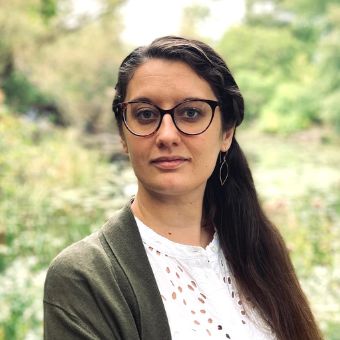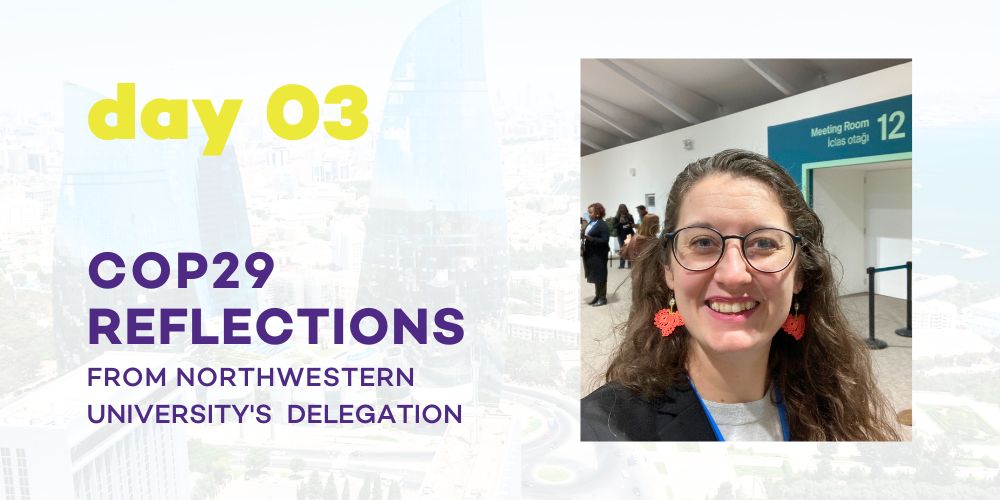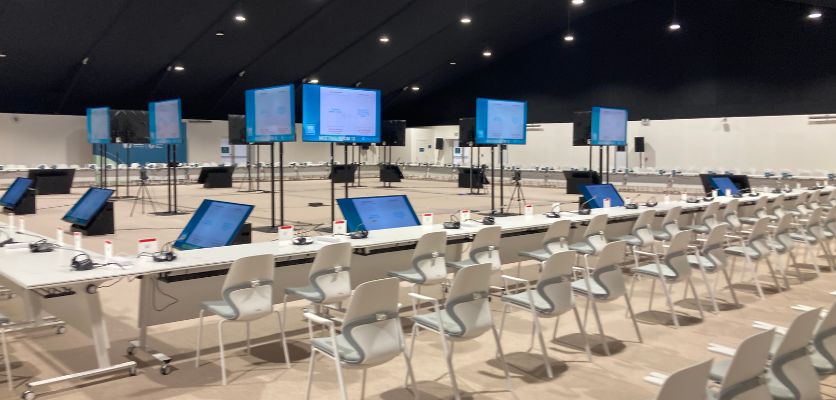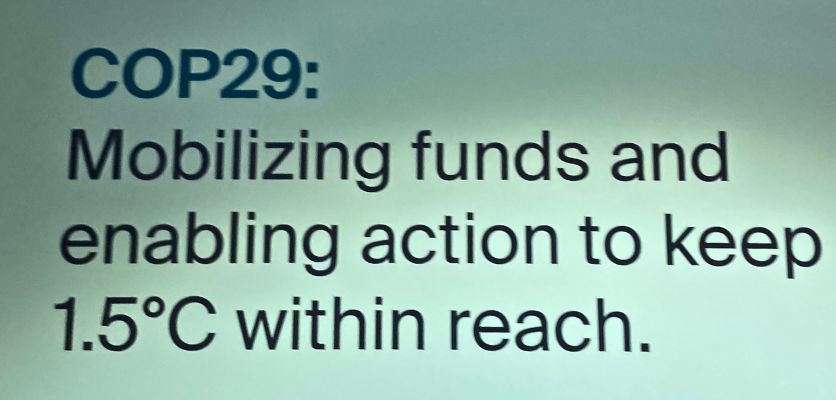Reflections from Northwestern University's COP29 Delegation: Day 3
For a fourth year, a delegation of Northwestern University students and faculty supported by the Buffett Institute is among more than 30,000 researchers, policymakers, industry leaders and activists at the world’s largest annual international treaty negotiations and climate summit, the 29th Conference of Parties (COP29) to the United Nations Framework Convention on Climate Change (UNFCCC), this year hosted in Baku, Azerbaijan. Each day, a different Northwestern delegate is blogging about their experiences and reflections. Day 3 features Diana K. Elhard, a PhD candidate in the Department of Political Science.
This COP has been billed by international media, researchers, diplomats and the COP29 Presidency as the “Finance COP.” The primary reason for this moniker is that the countries that are Parties to the Paris Agreement have a deadline to establish a new international climate finance goal by 2025. COP29 is the last negotiation where they can reach an agreement within their self-imposed deadline. In 2021, the Parties established a three-year-long process called the ad-hoc work program on the New Collective Quantified Goal on climate finance (NCQG), which was to help inform the result expected this year.
This week I have spent several days following climate finance negotiations at COP29. This involves sitting in a back row in the main meeting room or in an overflow room where the negotiations are broadcast live. Dozens of civil society representatives and Party staff fill these conference rooms. These meetings are not recorded or accessible without prior credentials from the UNFCCC, so we all listen and take notes as best as we can.
Meeting Room 12 in the Blue Zone at COP29 is the largest meeting room with 100 seats at the negotiating table for Parties. It is where the NCQG is negotiated.
Climate finance is critical for people and the UNFCCC process. Climate finance is key to addressing the increasingly severe impacts of climate change, yet most climate finance is spent domestically by or in wealthy European and North American states rather than reaching those facing the worst effects of climate change. These impacts are increasingly dire for millions of people, plants, animals and ecosystems, and the harms are unequally distributed. This injustice is more glaring given the historic responsibility for the most damaging greenhouse gas emissions lies with European and North American states. Current climate finance is not meeting the moment in terms of scale, effectiveness or geographic distribution.
A slogan on a wall in the Blue Zone at COP29; limiting average global temperature rise to 1.5 degrees Celsius is one of the main goals of the 2015 Paris Agreement.
Country negotiators, investment bankers and feminist organizers all see climate finance as an essential part of an effective climate change response. Since 1992, climate finance has been the linchpin of international climate change negotiations. Mitigation, adaptation and responding to loss and damage are all resource-intensive in terms of capacity and financial cost, which is repeatedly acknowledged in UNFCCC decisions. However, climate finance is not provided at the scale necessary to halt climate change nor to respond to current climatic impacts. This disconnect between textual recognition of the importance of finance and lackluster provision fosters distrust between Parties.
I have followed climate finance negotiations within the UNFCCC since 2015. As part of my PhD research, I attended all NCQG meetings between 2022–2024, either virtually or in person, with the support of the Buffett Institute for Global Affairs and the American Political Science Association. At NCQG meetings, civil society was invited to participate equally alongside Parties in most NCQG meetings, a unique step in the UNFCCC. At COPs, for example, civil society may only speak if explicitly invited to do so by the Parties. The new mode of participation in the NCQG was a step towards a more inclusive process. Many types of actors participated and, over the course of three years, put their thoughts on the table. In October 2024 a draft document for negotiation at COP29 was produced. This text left a lot out: there was no agreed start or end date for the goal and there was no agreed number, no quantum, but there were many suggestions that Parties could have used as a starting point for debate at COP29.
On the first day of negotiations on the new goal at COP29 this draft—three years in the making—was disregarded. Party after Party requested it be laid to the side in the negotiation room and asked the UNFCCC Secretariat to draft a new text based only on their inputs. Today, November 13, a new text was drafted based on the inputs of Parties only.
While there is still time at this “Finance COP” to agree on a new goal, it is stunning that Parties turned away from three years of work in one two-hour negotiation session. What is more, the new text is not based on the inputs of the more inclusive process where Parties and civil society observers both had a voice. There is still no progress on agreeing on a timeframe (start or end dates) for the goal or a quantum. As the first week of COP29 is well underway, it is unclear if the UNFCCC process will deliver a meaningful goal for people who need it.
As someone who followed and studied this process for its duration, I am left wondering if it will have had any identifiable impact on the resulting new international climate finance goal, if and when one is agreed.

Diana K. Elhard is a PhD candidate in the Department of Political Science at Northwestern University. Her dissertation project focuses on UNFCCC climate finance negotiations. She follows UNFCCC meetings as well as the Standing Committee on Finance, Global Environment Facility, Green Climate Fund and the ad-hoc work program on the New Collective Quantified Goal on climate finance (NCQG), among others. Diana has studied the UNFCCC since COP21 in 2015, where the Paris Agreement was agreed. Utilizing qualitative methods, she follows these processes and key actors including variation in their roles and their use of different political discourses.



